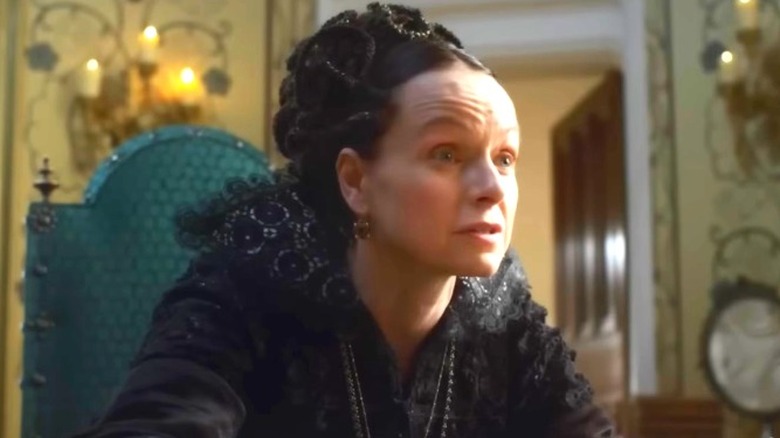The Serpent Queen Showrunner Raises A Powerful Question About Power Following The Season 1 Finale
Based on Leonie Frieda's "Catherine de Medici: Renaissance Queen of France," the vividly realized Starz adaptation "The Serpent Queen" delivers a gripping, wildly popular series exploring the murderous intrigue and Machiavellian seductions of the 16th-century French court. Initially, Liv Hill stars as Catherine, the Italian Duchessina of Urbino, who, as a young girl, is married off to King Henry II of France when she's just 14 years old. Expected per the time period's social structure to remain meekly in the background and exist only to produce royal heirs, Catherine will end up dashing these expectations entirely.
With Samantha Morton assuming the role of Catherine in later years as French Queen Regent, the series follows her as she matures and evolves into a woman to be reckoned with. Amid the back-stabbing betrayals and risky alliance-building of the court, Catherine will employ everything from brute force to unholy magic as she schemes to put her son on the throne. As such, she must survive in a world where men hold almost all positions of true importance and where hide-bound, traditional male prerogatives dictate the roles most women are limited to and the penalties they can face for transgressing those boundaries. Against this background, the showrunner of "The Serpent Queen" addressed the definition of power and the relationship of a character like Catherine to achieving and maintaining her hold on that power.
The Serpent Queen's showrunner says the series examines the price of power
Speaking with Decider about "The Serpent Queen" finale episode and what to expect in the already-ordered Season 2, showrunner Justin Haythe explained that a major element of the overall series' narrative involves the question of power and its transformative effects on the individual, especially a female in a position of power during this era. "She really did run France," Haythe said. "She ran a country no woman was supposed to." The series' exec then went on to discuss the fact that while the times were certainly tumultuous in a number of ways and Catherine was no shrinking violet when it comes to violence, nonetheless, "She ushered in an era of relative, an attempt at least, of relative peace, tolerance and pluralism."
While Catherine displayed admirable characteristics as the true ruler of France for an extended period, Haythe said he wanted the show to examine exactly what toll was exacted by her ruthless drive to gain control and keep it. "I think the open question for this show — for this season, for next season — is at what cost, you know?" He further commented that he felt Catherine had basically no alternative path to the one she took and that "The question going forward is where you cross the line from where you [do what you] have to do and where you do it because you want to. That's my interpretation."

